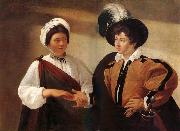Wholesale Oil Painting No Minimum |
|||||||||||
|
|
|||||||||||

|
|||||||||||
|
|
|
||||||||
CaravaggioItalian Baroque Era Painter, ca.1571-1610 Italian painter. After an early career as a painter of portraits, still-life and genre scenes he became the most persuasive religious painter of his time. His bold, naturalistic style, which emphasized the common humanity of the apostles and martyrs, flattered the aspirations of the Counter-Reformation Church, while his vivid chiaroscuro enhanced both three-dimensionality and drama, as well as evoking the mystery of the faith. He followed a militantly realist agenda, rejecting both Mannerism and the classicizing naturalism of his main rival, Annibale Carracci. In the first 30 years of the 17th century his naturalistic ambitions and revolutionary artistic procedures attracted a large following from all over Europe. |
||||||||
|
|
||||||||
La Diseuse de bonne aventure
La Diseuse de bonne aventure Painting ID:: 31005 |
mk70
Toile
H.0.99
L.1.31
Paris,Musee du Louvre
mk70 Toile H.0.99 L.1.31 Paris,Musee du Louvre |
|||||||
|
|
||||||||
|
Jan Cossiers 1600-1671 Flemish Jan Cossiers Location Flemish painter and draughtsman. After serving an apprenticeship with his father, Anton Cossiers ( fl 1604-c. 1646), and then with Cornelis de Vos, he went first to Aix-en-Provence, where he stayed with the painter Abraham de Vries (1590-1650/62), and then to Rome, where he is mentioned in October 1624. By 1626 he had returned to Aix and had contact with, among others, Nicolas-Claude Fabri de Peiresc, the famous humanist, who recommended him to Rubens. By November 1627 Cossiers had settled back in Antwerp. The following year he became a master in the Guild of St Luke, and in 1630 he married for the first time; he married a second time in 1640. La Diseuse de bonne aventure circa 1630(1630) Medium oil on canvas cyf |
||||||||
|
|
||||||||
|
Prev Next
|
||||||||
|
|
||||||||
|
Related Paintings to Jan Cossiers :. |
||||||||
|
|
||||||||
|
CONTACT US |

